The NBA’s rookie scale, which determines how much first-round picks earn during their first four NBA seasons, also dictates how much the qualifying offers will be worth for those players when they reach restricted free agency after year four. However, the value of those qualifying offers can fluctuate depending on whether or not a player has met the “starter criteria.”
Here’s how the starter criteria works in a typical year:
- A player who is eligible for restricted free agency is considered to have met the starter criteria if he plays at least 2,000 minutes or starts 41 games in the season before he reaches free agency.
- A player can also meet the criteria if he averages either of those marks in the two seasons prior to his restricted free agency. For instance, if a player started 50 games one year and 32 the next, he’d meet the starter criteria, since his average number of starts over the last two seasons is 41.
The thresholds for the starter criteria this year are a little different due to the truncated nature of the 2020/21 season. We outlined those tweaks at the start of the season.
A player’s ability or inability to meet the starter criteria can affect the value of the qualifying offer he receives as a restricted free agent, as follows:
- A top-14 pick who does not meet the starter criteria will receive a qualifying offer equal to the amount the 15th overall pick would receive if he signed for 120% of the rookie scale.
- A player picked between 10th and 30th who meets the criteria will receive a qualifying offer equal to the amount the ninth overall pick would receive if he signed for 120% of the rookie scale.
- A second-round pick or undrafted player who meets the criteria will receive a qualifying offer equal to the amount the 21st overall pick would receive if he signed for 100% of the rookie scale.
- For all other RFAs, the standard criteria determine the amounts of their qualifying offers.
Extending a qualifying offer to a player eligible for restricted free agency officially makes that player an RFA, ensuring that his team has the right of first refusal if he signs an offer sheet with another club. It also gives the player the option of signing that one-year QO.
Generally, the value of a restricted free agent’s qualifying offer isn’t hugely important, since very few RFAs accept those offers outright. There are exceptions though.
Last offseason, for instance, Bruce Brown met the starter criteria heading into restricted free agency, increasing the value of his qualifying offer to $4,736,102. The Nets decided to issue that qualifying offer and he accepted it. Had he fallen short of the starter criteria, Brown only would have been eligible for a qualifying offer worth around $2MM and his free agency could have played out very differently.
Top-14 picks who failed to meet starter criteria:
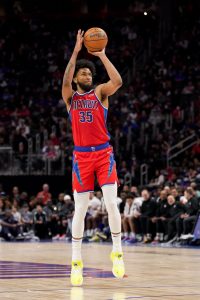 With all that in mind, let’s check in on how this year’s RFAs-to-be will be impacted by the starter criteria. Listed below are the former top-14 picks on track for restricted free agency who did not meet the starter criteria. These players will be eligible for qualifying offers worth $7,228,448.
With all that in mind, let’s check in on how this year’s RFAs-to-be will be impacted by the starter criteria. Listed below are the former top-14 picks on track for restricted free agency who did not meet the starter criteria. These players will be eligible for qualifying offers worth $7,228,448.
- Marvin Bagley III (Pistons)
- Collin Sexton (Cavaliers)
- Kevin Knox (Hawks)
Seven of the 14 players selected with lottery picks in the 2018 draft signed rookie scale extensions in 2021, meaning they won’t have to worry about the value of their qualifying offers this offseason.
Of the other seven, the three players listed above failed to meet the criteria. Bagley is the biggest loser in the trio — his qualifying offer would’ve been worth approximately $14.76MM if he had met the starter criteria. Sexton’s would’ve been about $8.56MM, while Knox’s would’ve been $7.92MM.
Even with the amount of his qualifying offer lowered a little, Knox likely won’t receive a QO at all, making him an unrestricted free agent. Bagley and Sexton are much safer bets for QOs.
Top-14 picks Deandre Ayton (Suns) and Mohamed Bamba (Magic), each met the starter criteria, locking in their QO amounts at $16.42MM and $10.1MM, respectively. Miles Bridges (Hornets) also met the starter criteria, as detailed in the next section.
Jerome Robinson was the only top-14 pick from ’18 who was waived before completing his rookie contract — he’s no longer on an NBA roster and won’t be eligible for a qualifying offer this summer.
First-round picks between 10-30 who met starter criteria:
A player who fell into this category would see the amount of his qualifying offer increase to $7,921,300. Bridges, the No. 12 overall pick, was the only player to qualify.
As a result of meeting the starter criteria, Bridges’ qualifying offer will increase from about $7.46MM to $7.92MM, a modest bump. It shouldn’t change the outlook of his free agency, since he’ll almost certainly receive a lucrative long-term offer.
Trail Blazers guard Anfernee Simons looked like one of the best candidates to join Bridges in this group. He needed to make 41 starts this season for Portland, but only got to 30 before he was shut down for the season with a left knee injury. His qualifying offer will remain at $5.76MM, but that shouldn’t have a major impact on his free agency, since he’ll likely work out a multiyear deal with the Blazers.
Meanwhile, because Kings wing Donte DiVincenzo was a full-time starter for the Bucks in 2020/21, he only needed to make seven starts this season to meet the starter criteria. However, he ultimately started just once for Milwaukee and Sacramento, even when he was playing heavy minutes down the stretch for the Kings.
DiVincenzo’s qualifying offer will remain at $6.6MM, which actually could have a tangible effect on his free agency — if he doesn’t get a multiyear offer with a starting salary much higher than his qualifying offer, accepting the QO and reaching unrestricted free agency in 2023 may be DiVincenzo’s best option. Presumably, that’s why his camp reportedly wasn’t thrilled that he was still coming off the bench at the end of the season.
Second-round picks and UDFAs who met starter criteria:
The players listed below signed as second-round picks or undrafted free agents, but met the starter criteria and are now eligible for a qualifying offer worth $4,869,012.
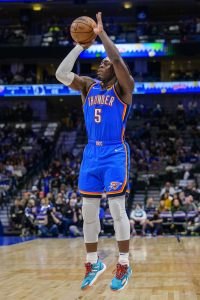 Luguentz Dort (Thunder)
Luguentz Dort (Thunder)- Jae’Sean Tate (Rockets)
Of course, it’s very possible neither Dort nor Tate will even become a free agent this summer, since their contracts both include team options for 2022/23.
The Thunder could decide to turn down Dort’s minimum-salary option for next season in order to make him a restricted free agent this year instead of an unrestricted free agent next year, but there’s no guarantee they’ll go that route. If they do, his QO would be worth $4.87MM instead of $2.22MM.
Meanwhile, there’s no incentive for the Rockets to decline Tate’s option, since he’ll still be eligible for restricted free agency in 2023, so the amount of his potential qualifying offer this summer will be rendered moot.
Among other second-round picks and undrafted free agents, Hornets wing Cody Martin (1,866 minutes), Clippers swingman Amir Coffey (30 starts), and Trail Blazers forward CJ Elleby (28 starts) are a few who were in the ballpark of the starter criteria, but none got there. Martin, Coffey, Elleby, and the rest of this year’s restricted free agents won’t have their projected qualifying offers impacted by the starter criteria.
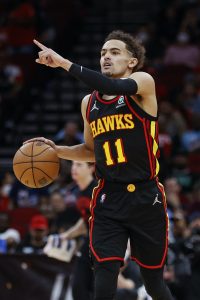 The Hawks and Hornets will each be missing a key player, as big man
The Hawks and Hornets will each be missing a key player, as big man 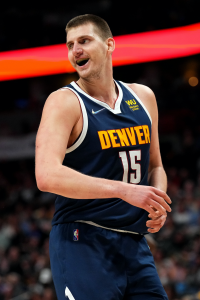 Nuggets star
Nuggets star 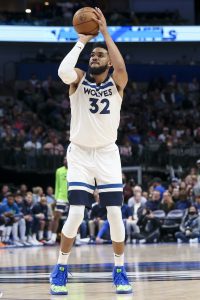 The current contracts for Towns and Booker are virtually identical, and if they both earn All-NBA nods, their next deals could be too. With seven years of NBA experience and two years left on their respective contracts, they’d be eligible to sign four-year, Designated Veteran extensions this offseason.
The current contracts for Towns and Booker are virtually identical, and if they both earn All-NBA nods, their next deals could be too. With seven years of NBA experience and two years left on their respective contracts, they’d be eligible to sign four-year, Designated Veteran extensions this offseason.